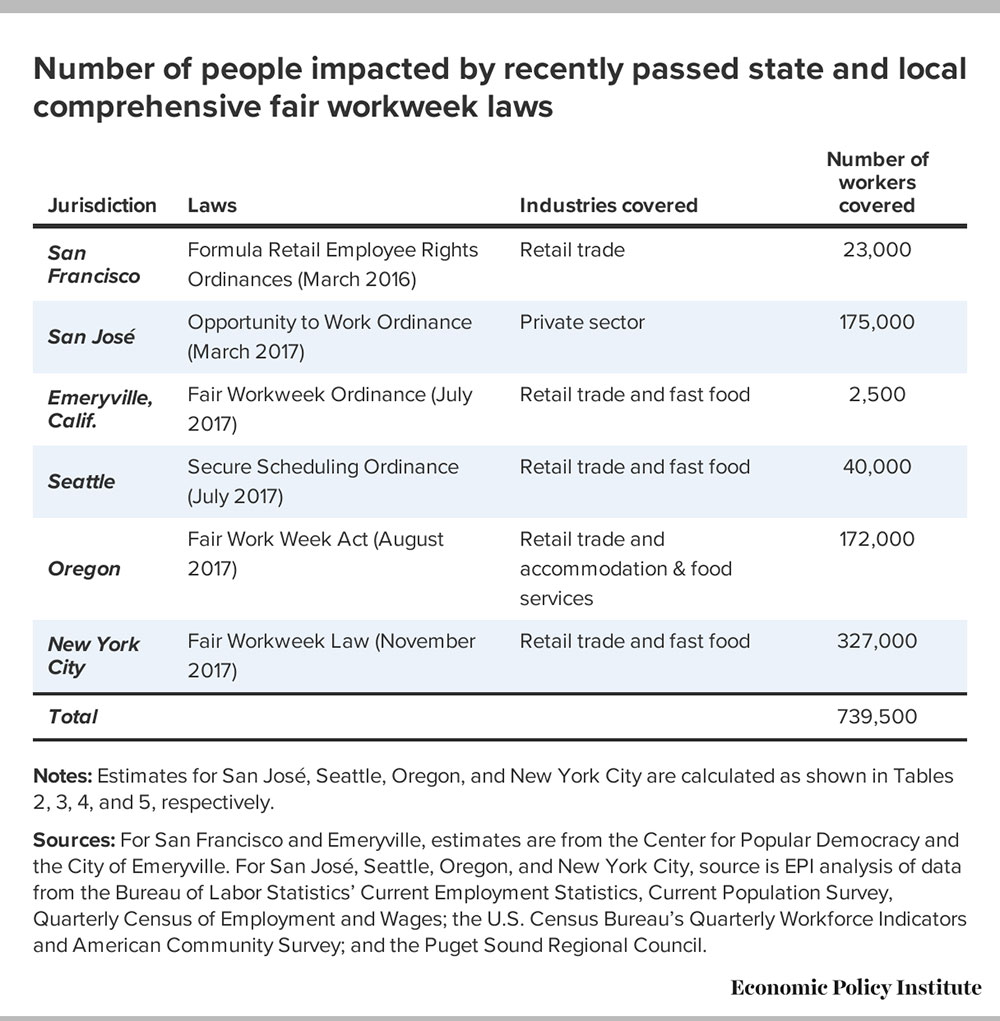June 6, 2019
By Mike Morini, CEO of WorkForce Software
The way we work is evolving by the day. Virtually every sector has seen an uptick in hourly wage workers over the past decade. With recent reports estimating more than 80 million hourly workers – representing 58% of all wage earners in the U.S. – it’s no surprise that state and federal legislation is evolving to align with hourly workers’ needs. The question is, will employers recognize the benefits and voluntarily offer employees greater autonomy and flexibility when it comes to scheduling?
In the U.S., a new class of legislation is gaining momentum around predictable schedules. Dubbed “fair workweek laws”, these regulations center around an employee’s ability to have a work schedule that allows them to plan their lives beyond work, including arranging for child care, managing multiple jobs, and having a predictable wage. The equity afforded under the legislation promises to provide these basic rights to employees, often at the lowest scale of the wage ladder, for whom unexpected scheduling can have a significant impact.
Fair scheduling reaches far beyond compliance, though. Research shows that flexible scheduling improves employee engagement and productivity. The reality is that today’s talent seeks it out, and smart employers are establishing voluntary flexible scheduling policies in order to attract and retain top talent at a time when employees have more choice than ever before.
To date, San Francisco, Seattle, and New York City have all enacted city-level fair scheduling laws. Last July, Oregon became the first state to pass predictive scheduling legislation, with an additional 13 states and 4 municipalities across the U.S. considering legislation in 2019 or 2020. As of mid 2018, the Economic Policy Institute estimated that 740,000 workers were already covered by predictive scheduling laws at that point. Assuming this trend continues, we could very well see predictive scheduling laws become the rule rather than the exception by about 2025.
Although, the current legislation is largely targeted at the retail, food service and hospitality industries, any business which deals with dynamic demand or that regularly makes schedule changes close to the start of the shift should evaluate predictive scheduling as an organizational policy. To do this, employer brands must (1) gain a clear understanding of the benefits of voluntarily enacting predictive scheduling and (2) assess their organization’s ability to adapt if and when legislation rolls out in a City or State where they operate.

For employees, predictive scheduling provides flexibility, stability, and, according to recent research, even has health benefits. New labor entrants, namely GenZ and Millennials, are breathing new life into part-time jobs – especially contract and freelance work. Their workweek is like a 1,000-piece jigsaw puzzle. With so many moving parts, it can all fall apart if even one piece moves out of place. Predictable work schedules support these multi-tasking employees. It gives giving them the freedom they need to guarantee hours to multiple employers. To attract and retain talent, employers need to provide the type of predictability that these types of employees will demand.
Stability is now and always has been a critical element of employment. With fair scheduling in place, employees have an improved sense of job security. Their hours are laid out clearly and they can plan around them for the week, allowing them to budget more efficiently and calculate how much they’ll earn.
There’s also proven health benefits to predictive scheduling. Research from Human Impact Partners shows that unstable schedules with little advanced notice or “on-call” structures result in higher levels of stress and poor mental health outcomes in employees. One study found that hourly workers who received one week or less notice of their schedules were more likely to report their health as poor or fair (rather than good or excellent) than workers with more advanced notice. About 20% of those receiving one week or less of schedule notice reported poor or fair health, compared to about 12%-13% for workers with more notice. On the other hand, the same study found that workers who say they have the necessary flexibility to meet work, family, and personal responsibilities exercise more frequently and are more likely to self-identify their lifestyles as healthy.
As with any lasting policy, fair work is not a one-way street. There are proven benefits for employers, too. With unemployment at a 10-year low, the battle for bright minds is intense. As predictive scheduling laws roll-out in jurisdictions, there will be pressure on employers seeking to attract talent to adopt predictive scheduling policies. For those enacting voluntary policies, employees are more likely to give their employer recognition for acting ahead of policy reinforcement – an added benefit.
Employee satisfaction is an organization’s gain. With fair work policies, employees will be happier knowing they can “set and forget” childcare and better plan their time outside of work. They have improved insight into schedules, which lessens the mental load, which in turn means they are more present and engaged during work hours.
There’s no doubt that engaged employees stay in their jobs longer. Moreover, a recent Gallup poll showed that employee engagement has a direct impact on business performance. Companies with high employee engagement see a 41% reduction in absenteeism. For those with disengaged teams, turnover is high and costly. With voluntary turnover costing U.S. businesses $1 trillion every year, losing good talent due to low engagement is bad for the bottom line – and for morale.
The bottom line: Predictive scheduling won’t be the deciding factor in job satisfaction, but it will contribute to it. Companies should evaluate the opportunity from within, get alignment from key stakeholders and have a strategy in place, whether they plan to use predictive scheduling voluntarily or hold until laws are enacted in states where they operate.
 Mike Morini, Chief Executive Officer, WorkForce Software
Mike Morini, Chief Executive Officer, WorkForce Software
Mike Morini’s approach to driving company growth is centered on employees, customers, and the broader community of partners and analysts. Mike is a 30-year software veteran experienced in growing and scaling enterprise software companies. With an extensive background building out global cloud-based platforms, he has helped shape and guide multiple fast-growth companies in the cloud arena. Before joining WorkForce Software, Mike was previously in CEO and COO positions at SAP, Aria Systems, OutlookSoft, InterWorld, and Verbind. Mike holds a BA from Colgate University. Contact: mmorini@workforcesoftware.com.
Scott Ellyson, CEO of East West Manufacturing, brings decades of global manufacturing and supply chain leadership to the conversation. In this episode, he shares practical insights on scaling operations, navigating complexity, and building resilient manufacturing networks in an increasingly connected world.